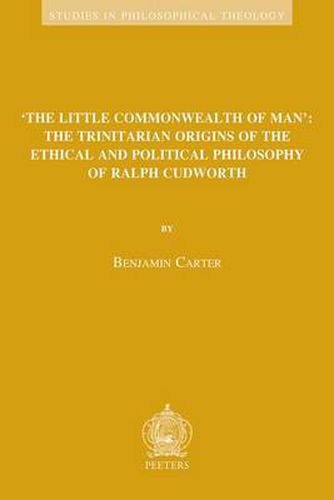Readings Newsletter
Become a Readings Member to make your shopping experience even easier.
Sign in or sign up for free!
You’re not far away from qualifying for FREE standard shipping within Australia
You’ve qualified for FREE standard shipping within Australia
The cart is loading…






This book presents a contextual study of the life and work of the Cambridge Platonist Ralph Cudworth (1617-1688). Focusing on the theological basis of Cudworth’s ethical philosophy, this book unlocks the hitherto ignored political aspect to Cudworth’s ethical philosophy. Through a detailed examination of Cudworth’s published works - particularly his voluminous True Intellectual System of the Universe -, his posthumously published writings, and his ‘freewill’ manuscripts Benjamin Carter argues that the ethical and political arguments in Cudworth’s philosophy develop out of Cudworth’s Trinitarian theology. Carter traces the link between Cudworth’s Trinitarianism and his ethical and political ideas by placing Cudworth’s work in the turbulent religious and intellectual context of seventeenth-century England, and the University of Cambridge in particular. He links Cudworth’s theology and philosophy to developments in English Puritan theology, to contemporary philosophical figures such as Thomas Hobbes, and draws out Cudworth’s often overlooked influence on the developping patterns of liberal and latitudinarian theology of late seventeenth-century England.
$9.00 standard shipping within Australia
FREE standard shipping within Australia for orders over $100.00
Express & International shipping calculated at checkout
This book presents a contextual study of the life and work of the Cambridge Platonist Ralph Cudworth (1617-1688). Focusing on the theological basis of Cudworth’s ethical philosophy, this book unlocks the hitherto ignored political aspect to Cudworth’s ethical philosophy. Through a detailed examination of Cudworth’s published works - particularly his voluminous True Intellectual System of the Universe -, his posthumously published writings, and his ‘freewill’ manuscripts Benjamin Carter argues that the ethical and political arguments in Cudworth’s philosophy develop out of Cudworth’s Trinitarian theology. Carter traces the link between Cudworth’s Trinitarianism and his ethical and political ideas by placing Cudworth’s work in the turbulent religious and intellectual context of seventeenth-century England, and the University of Cambridge in particular. He links Cudworth’s theology and philosophy to developments in English Puritan theology, to contemporary philosophical figures such as Thomas Hobbes, and draws out Cudworth’s often overlooked influence on the developping patterns of liberal and latitudinarian theology of late seventeenth-century England.